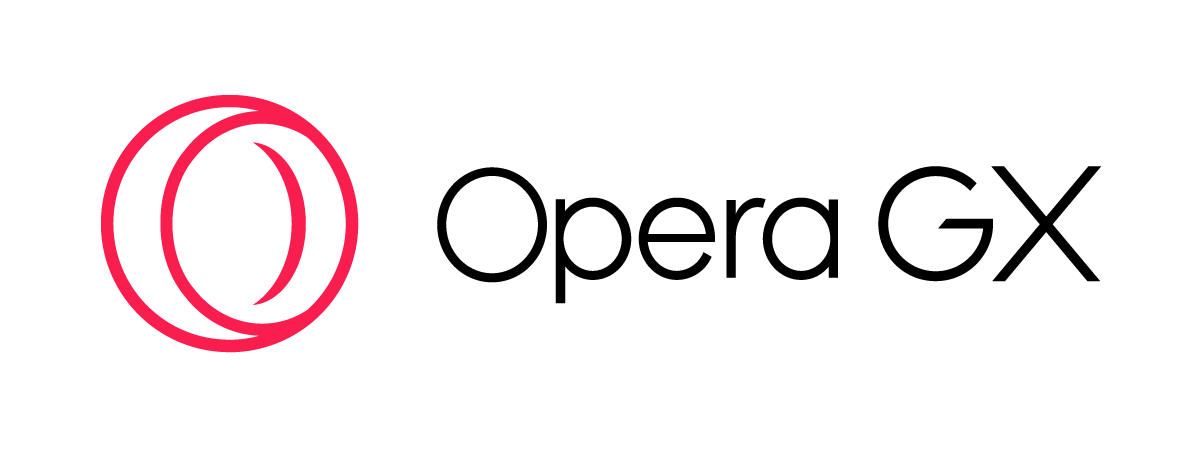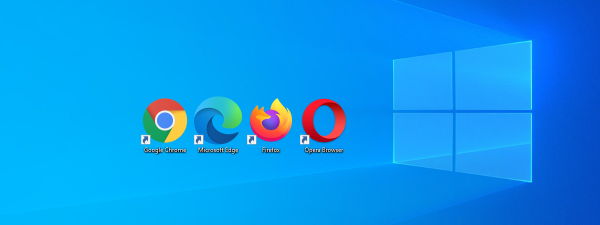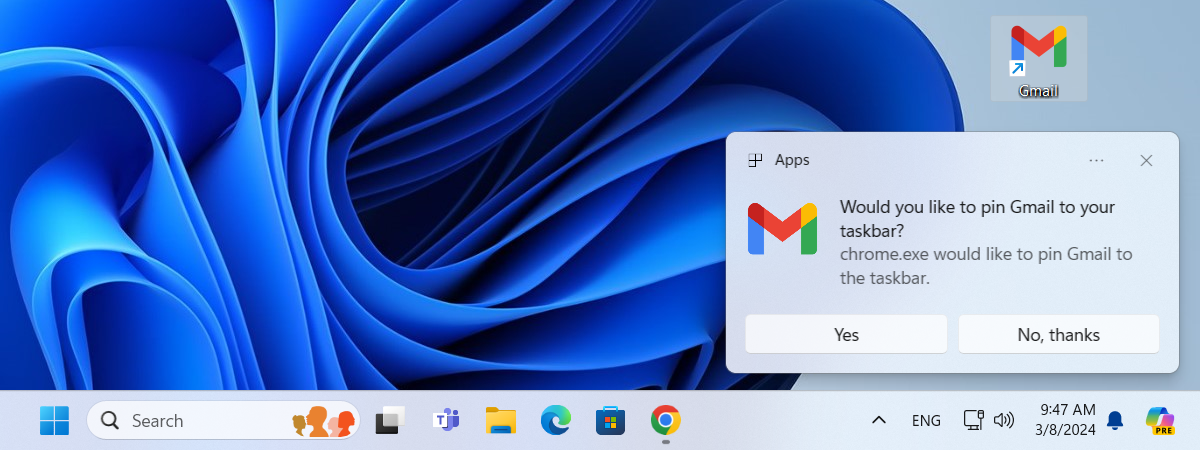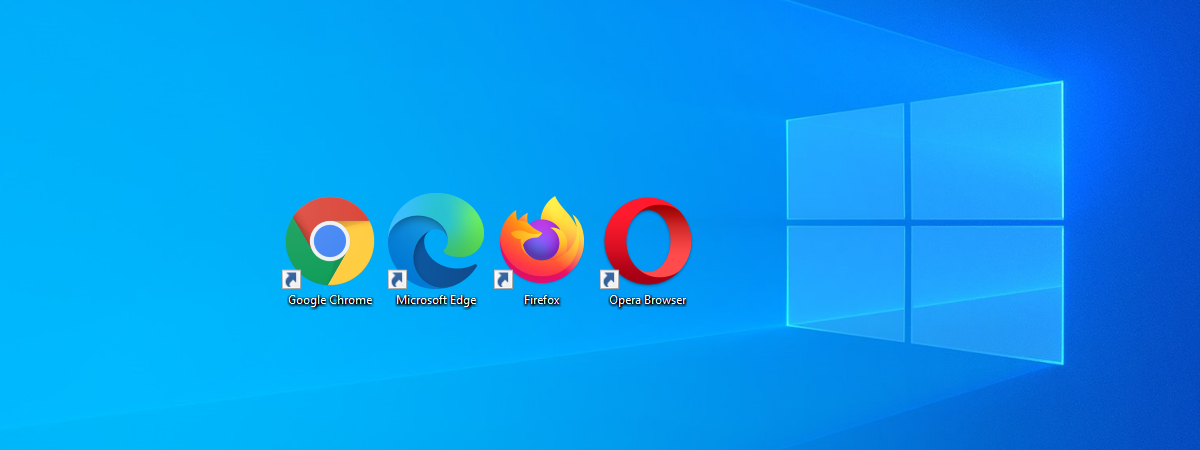
There are so many web browsers you can try and use that their sheer number might feel overwhelming. So, if you’re trying to find the best web browser in 2023, we thought it would be a good idea to check out the most popular ones for you. There are a lot of aspects to consider when deciding on a web browser, including but not limited to speed, features, security, and privacy. Let’s take a look at the most popular web browsers and see what each of them has to offer and, most importantly, which ones are the fastest:
The best browsers of 2023: What do they offer?
According to statcounter.com, the most popular web browsers for desktop computers in the last twelve months are Chrome, Edge, Safari, Firefox, and Opera. These five browsers have a total market share of 97.11%, leaving only 2.89% for all the other niche browsers.

Desktop Browser Market Share Worldwide in 2023
As you can see in the chart above, Google Chrome is the undisputed leader, holding a huge 66.45% market share, which is six times more than the next competitor, Microsoft Edge.
After hearing what some of our readers had to say, I decided to benchmark and test not only the main browsers (Chrome, Edge, Firefox, Opera) but also a few other niche browsers that an increasing number of people are starting to use: Opera GX, Vivaldi, Brave. As this is an analysis for Windows, made on a Windows PC, I couldn’t and didn’t include Safari, the default web browser for Mac computers.
Before getting to the benchmarking part and seeing which of the browsers are faster, let’s first take a look at all of them and what they have to offer besides raw speed and performance:
Google Chrome
Chrome, which is based on the free and open-source Chromium web browser, is the uncontested market leader of all desktop web browsers, with a global market share of more than 65% in the last 12 months. Google’s Chrome browser is well-known for its speed, minimalist design, and outstanding integration with other Google services.
Furthermore, this web browser offers a huge collection of extensions and personalization options that allow you to change the way it works and looks in order to improve your browsing experience. However, many people complain about Chrome’s unreasonable memory utilization, as well as its privacy-invading built-in features.
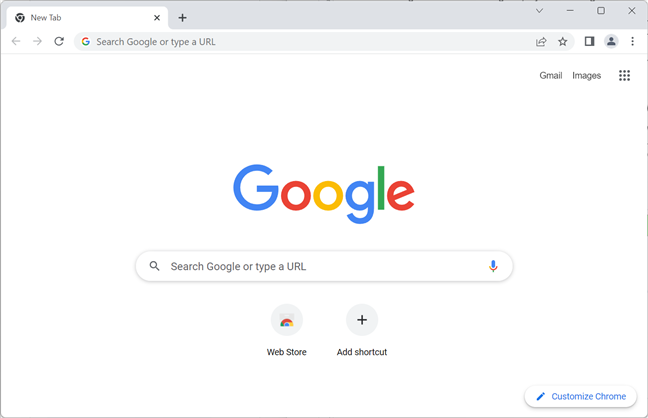
Google Chrome
TIP: Chromium, the browser on which Chrome is based, uses the Blink browser engine. Blink was built as part of the Chromium project, and large companies such as Google, Meta, Microsoft, Opera Software, Adobe, Intel, IBM, and Samsung are contributing to its development. The rendering engine is the one responsible for drawing and animating web pages, creating everything that you see on a website.
Microsoft Edge
Edge, which is Microsoft’s replacement for the old Internet Explorer, started by using a completely new rendering engine when it first launched but ultimately just moved on to using the same Chromium base as Google’s Chrome. This allows it to offer improved speed and compatibility with extensions designed originally for Chrome. In addition, because it’s made by Microsoft, Edge is also the best browser if you want the best level of integration with the company’s services and features, including but not limited to Windows 11 and Windows 10 operating systems, as well as Microsoft 365. The browser also stands out with its detailed privacy settings and additional features, such as vertical tabs, a sidebar, and built-in support for Bing Chat (based on Chat GPT). Although its market share has seen a significant boost lately, it still has a long way to go to seriously compete with Chrome on this front.
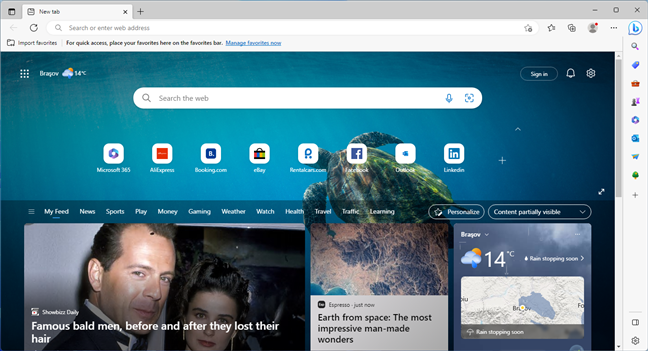
Microsoft Edge
Mozilla Firefox
Firefox, unfortunately, lost a lot of its momentum during the last couple of years, even if it’s one of the oldest and most iconic web browsers in history. Although its developers and user base are quite dedicated and loyal, it struggles to gain new users and only managed a market share of about seven percent during the last 12 months. Firefox is known for using its own rendering engine (Gecko) that draws the text and images from the websites you visit. It also aims to deliver excellent user control and privacy while offering plenty of personalization features. Among others, it’s worth mentioning that Firefox offers support for themes and tab groups, it has picture-in-picture mode, and even a VPN service.
However, besides losing popularity, Firefox is also lagging behind Chrome and Edge when it comes to the speed and performance offered while browsing the web. But more on that later in this review.
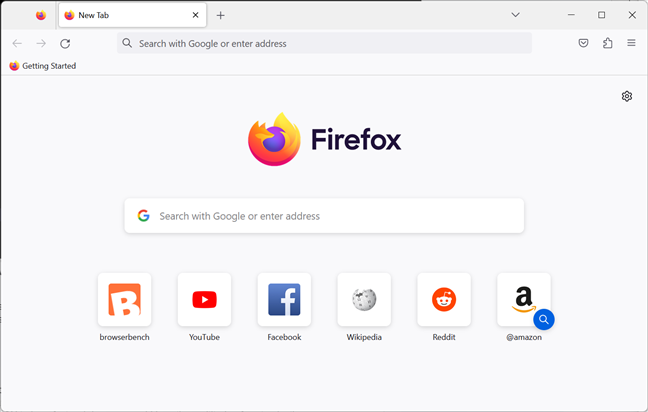
Mozilla Firefox
Opera
Opera is one of the most customizable web browsers today, and its features easily set it apart from all the others, although it’s based on the same Chromium browser and the same engine (Blink). On top of its built-in ad blocker and VPN service, Opera also comes with a sidebar where you can quickly access your favorite apps and services like WhatsApp, Facebook Messenger, Instagram, and Twitter. While Edge has a sidebar, too, the one in Opera is better when it comes to features, customization options, and how much it enhances your productivity.
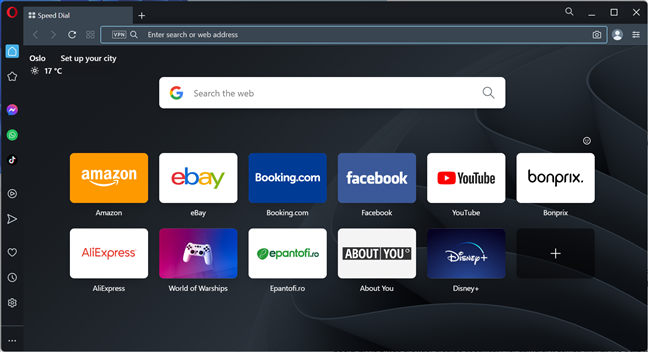
Opera
Brave
Brave is a niche web browser based on the Chromium project with a small market share, but special in its own way. You could say that its main purpose is to offer privacy, first and foremost. That’s something you immediately notice when using this web browser, as it disables, by default, advertisements, and trackers. That, on its own, makes the whole web surfing experience feel faster. To compensate creators, Brave allows users to opt-in to watch privacy-protecting adverts in exchange for Basic Attention Tokens (BAT), a type of cryptocurrency that users can offer to their favorite websites and/or authors as a tip. These tokens can be stored in a wallet built into the Brave browser that can also hold other crypto tokens.
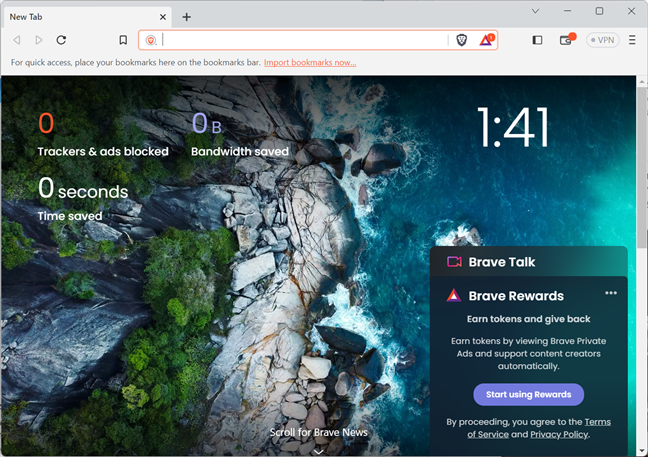
Brave
Opera GX
Opera GX is another web browser based on the open-source Chromium project, but created specifically for gamers. It comes with all the bells and whistles of the standard Opera browser but adds gamer-oriented features such as CPU and RAM limiters, Twitch connectivity, simple access to gaming news, and a whole range of mods and themes to customize the way it looks and sounds. As far as I know, no other browsers provide similar tools and customization possibilities.
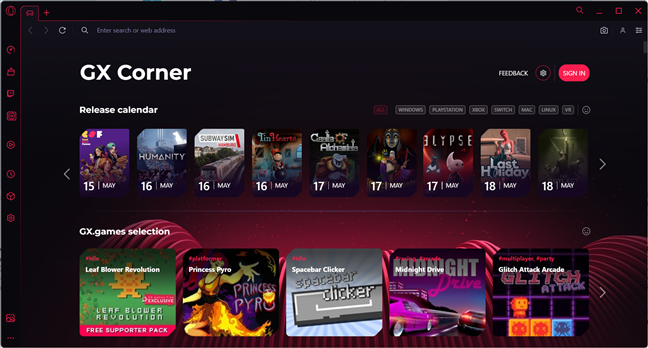
Opera GX
Vivaldi
Yet another browser based on the free and open-source Chromium project, Vivaldi is what you might call the ultimate customization browser. As far as I can tell, this is the browser with the most tools, settings, and options available for personalization, which makes it unique among other browsers. Considering how many options you get for changing everything from colors to fonts, tabs, panels, menus, shortcuts, mouse gestures, and keyboard commands, it’s very likely that there aren’t two users out there with identical-looking Vivaldi browsers.
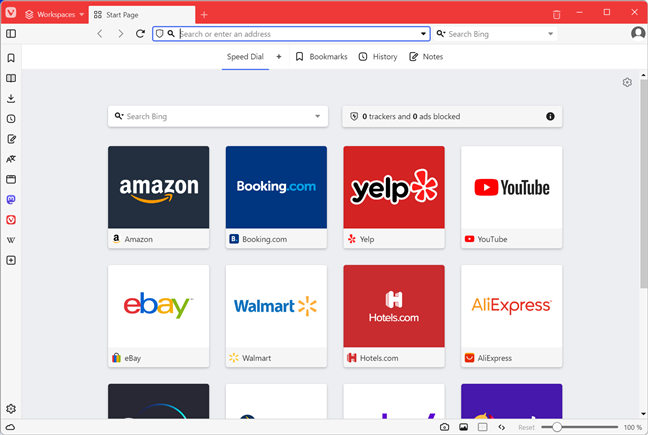
Vivaldi
TIP: Before seeing what’s the fastest browser out there, find out which browsers are best for your laptop’s battery life.
What’s the fastest browser of 2023?
Answering what is the best and the fastest web browser without further investigation is tough, as each browser has its strengths and weaknesses. For instance, some may be faster at loading web pages, some can be faster at running scripts, and some are faster at rendering graphics. So, the best way to determine which browser is the fastest is to benchmark them all. Furthermore, instead of running just one, I decided to run all three benchmarks offered by browserbench.org:
- JetStream 2: A benchmark suite for JavaScript and WebAssembly that advertises itself as being focused on the most advanced web applications. It rewards browsers that start up quickly, execute code quickly, and run smoothly.
- MotionMark: A graphics benchmark that measures a browser’s capability to animate complex scenes at a target frame rate.
- Speedometer: A browser benchmark that measures the responsiveness of web applications. It uses demo web applications to simulate user actions, such as adding to-do items.
Before showing you the results the web browsers obtained in these benchmarks, I have to point out that I ran all the tests on the same computer, using the following hardware and software components:
- Motherboard: ASUS Prime X670E-Pro WiFi
- Processor: AMD Ryzen 9 7900X
- CPU cooler: Cooler Master MasterLiquid ML360R RGB
- Memory: Kingston Fury Beast RGB DDR5-6000 32GB
- Graphics Card: AMD Radeon RX 7900 XT
- Storage: Kingston KC3000 NVMe PCIe 4.0 SSD (2TB)
- Monitor: ASUS ROG Strix XG32UQ
- Power Supply Unit: ASUS ROG Thor 850W Platinum
- Operating System: Windows 11 Pro version 22H2
Now let’s get to the results:
JetStream 2
The first benchmark I ran was JetStream 2. Results in this benchmark suite tell you how fast browsers are at running scripts and performing advanced tasks. A higher score means that your browser is going to be faster and perform better at loading and rendering complex web pages with many elements on them.
In my tests with Jet Stream 2, there were three winners: Chrome, Opera, and Opera GX. Their results were almost identical, with a tiny difference of just one point between them, which can be safely considered within the margin of error. The second place was also shared by three browsers: Microsoft Edge, Vivaldi, and Brave. Again, their results were identical or very close.
Mozilla Firefox is the web browser that lost this competition, managing a poor result compared to the others. If you set Firefox’s results and Chrome’s or Opera’s side by side, you’ll see that the latter browsers offer a performance increase of about 65%, which is huge!
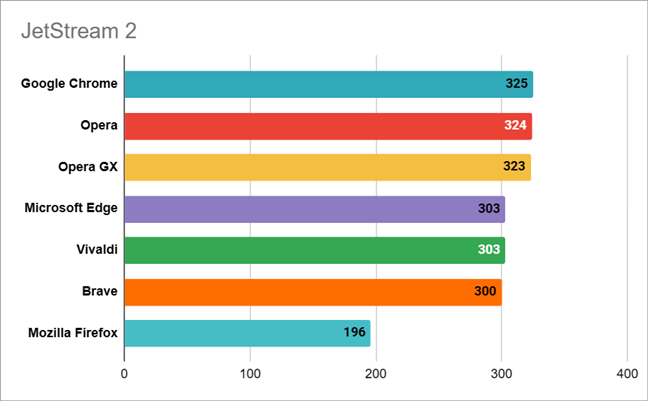
Web browsers results in the JetStream 2 benchmark
MotionMark
The MotionMark benchmark tests browser graphics performance by drawing multiple rendering elements. These elements could be SVG nodes, HTML elements with CSS styles, or series of canvas operations. The effects of the tests aim to reflect techniques commonly used on the web, stressing the graphics system rather than JavaScript. A higher score in this benchmark means the web browser is better at rendering visuals on webpages than browsers with lower scores.
The uncontested winner in MotionMark was Google Chrome, far ahead of all the other browsers. The surprise here was that Brave easily took second place, ahead of other browsers with a larger market share like Microsoft Edge or Opera. Edge was third by a small margin, while Opera GX, Opera, and Vivaldi managed similar results and took fourth place on the ladder. Unfortunately, or even shamefully, I’d say, Mozilla Firefox was the slowest browser in this test too. Its score is roughly half that of Chrome, which is quite telling.
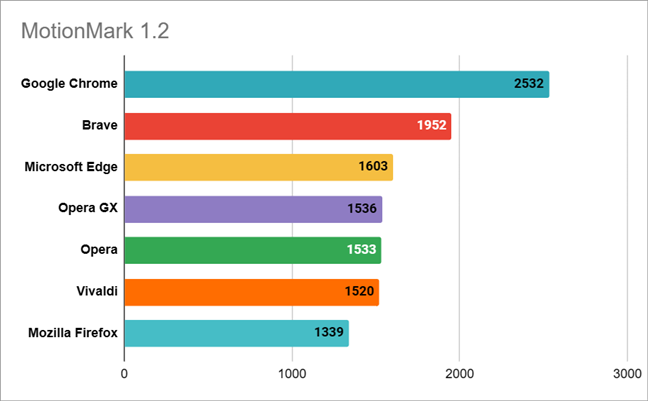
Web browsers results in the MotionMark 1.2 benchmark
Speedometer
The third benchmark, Speedometer, is designed to test a browser’s responsiveness in web apps by timing simulated user interactions. Among the user tasks it simulates, there are actions for adding, completing, and removing to-do items. In doing so, the benchmark calculates a score that shows you how fast a browser is on websites such as Facebook or Twitter, which by their nature involve a lot of user interaction.
In Speedometer, Chrome won again. Next came Opera, Opera GX, Vivaldi, and Microsoft Edge, all with pretty similar results and not far behind Chrome. The losers were Brave and, as you might have expected after seeing the previous charts, Mozilla Firefox.
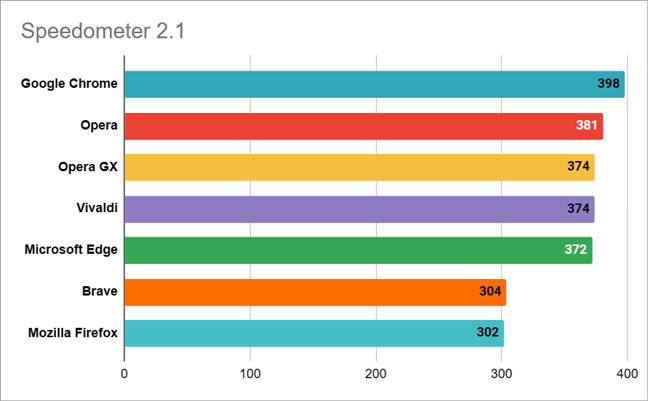
Web browsers results in the Speedometer 2.1 benchmark
After testing Chrome, Edge, Firefox, Opera, Opera GX, Vivaldi, and Brave, the benchmarking results paint a clearer picture than I expected. The uncontested winner in terms of web browsing speed is Google Chrome. It’s the fastest browser at running scripts, web applications, and even graphics. No other browsers can match it when looking at the overall performance.
However, Edge, Opera, Opera GX, Vivaldi, and Brave are fast too, and if you like the features or tools of one of them, using any of these browsers will offer plenty of performance and speed.
On a last and sad note, Firefox looks like the worst choice you could make right now. Others like me share the same sentiment. Leaving all its personalization features, tools, and options aside, the performance and web browsing speed you get from it are very poor compared to what the other browsers can offer. Hopefully, Mozilla will wake up and shake things up before it is too late.
How do web browsers compare in terms of RAM utilization?
Another good indicator of performance is memory consumption. After all, sometimes it may not matter if a web browser is fast at rendering web pages if it hogs your computer by requiring too much RAM to do it. In order to get an idea of what happens with the RAM when using the tested browsers, I devised a simple test:
I took the browsers compared earlier and opened five tabs in each of them, loading the same websites: Digital Citizen, Facebook, Twitter, Amazon, and Wikipedia. Then, I used Windows 11’s Task Manager to see how many MB of RAM each browser was using. These are the results:
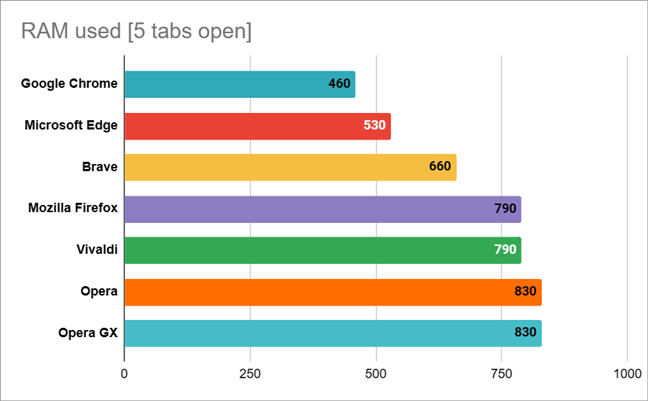
Web browsers RAM utilization in MB
As you can see, Chrome confirms once again that it’s the best web browser in this roundup, needing less memory than any of the other ones. Second in place is Edge, which was something I expected as Microsoft couldn’t have built it into its operating system without optimizing it. The third place is Brave, a pleasant surprise, followed by Firefox and Vivaldi, and continuing with Opera and Opera GX. It seems that with more customization options and features, RAM consumption increases.
Taking everything into account, including benchmarks results and RAM utilization, I can say that the winner of the browser battle in 2023 is Google Chrome!
What’s the best web browser for you?
Now you know more about what the most popular web browsers today have to offer in terms of performance. You’ve seen their results in benchmarks, and you can make a more informed choice on what your next web browser should be. Which of these browsers is your favorite? Why is that? Do you use a different browser than any of the ones I included in this article? Let me know if you have any questions in the comments section below.




